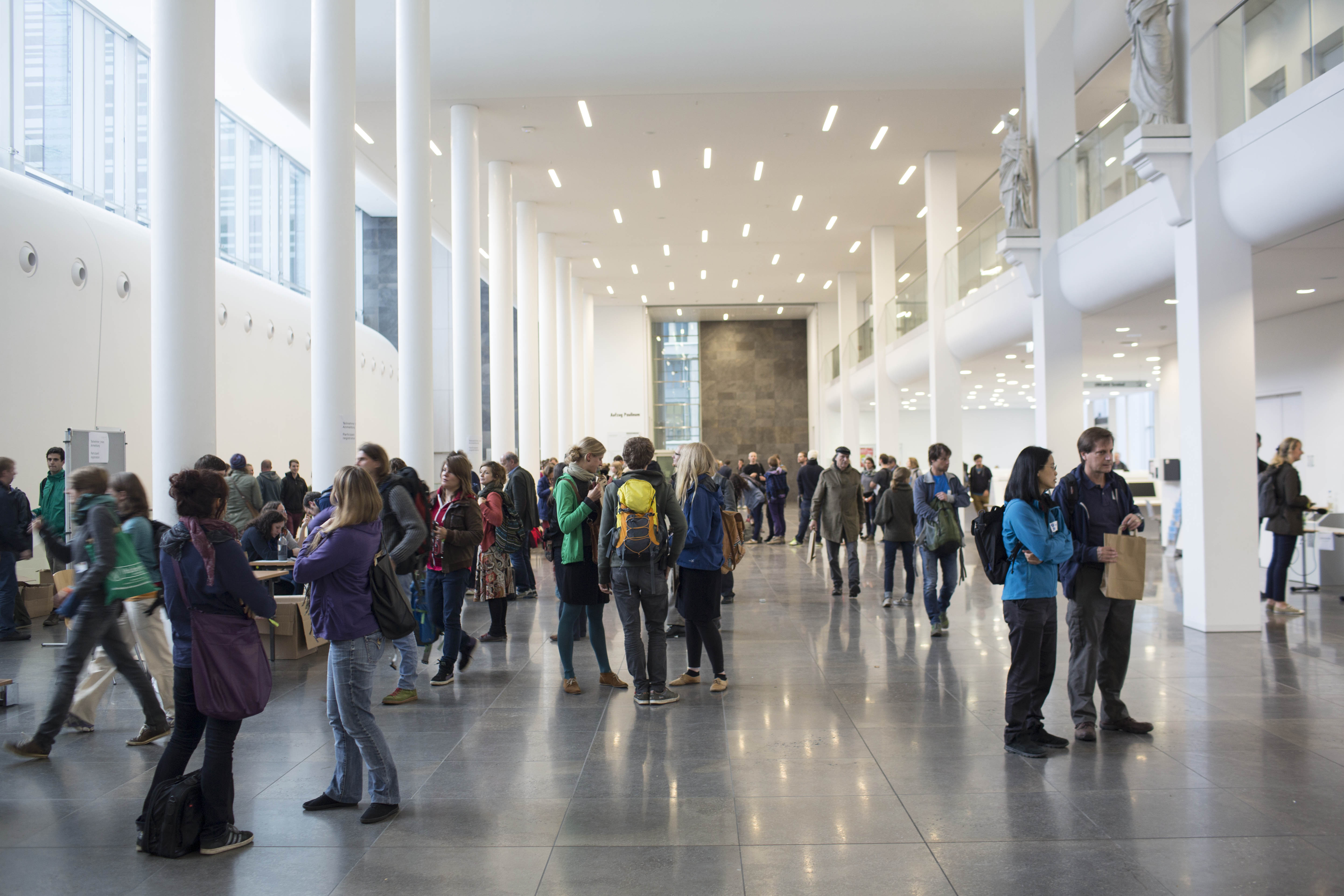The rise of far-right globalization criticism requires a new role for the Degrowth movement. ‘Progressive De-Globalization‘ could be the counter-project that is urgently needed. After the German and Austrian elections, it becomes clear once more that the rise of the new far-right is not a temporary phenomenon. Neither the difficult Brexit negotiations nor the missteps of Donald Trump are stopping new nationalism’s upward trend, as one could have hoped. Consequently, Yannis Varoufakis [1] diagnosed the long-term emergence of a nationalist international: nationalist and far-right authoritarian leaders, parties, movements, NGOs and media that are gaining ground and interconnect on a global scale. They bring about what left-wing mass movements and parties were not able or willing to do in the ten years since the financial crisis: they formulate an alternative to the discredited ideology of neo-liberalism. A strong narrative of national empowerment, paired with religious, racist, anti-feminist and anti-ecological resentments is becoming a serious challenger of neoliberalism’s TINA principle ("There Is No Alternative"). Although the new far-right questions only some aspects of neoliberal economic policy and radicalizes it in other aspects, it nevertheless acts as an ideological countermovement to the neoliberal and post-democratic political model. The far-right as a Degrowth-phenomenon The nationalist international has more to do with Degrowth – understood as an empirical state, not as a political demand – than it first seems. Decelerating growth or even stagnation have become the new normal in in the countries of the global North. While neoliberal globalization has created new centers of growth in the global south since the 1980s, growth slowed down in the north. Stagnating wages, precarious jobs, growing inequality – the subjective relationship between economic growth and quality of life eroded. It seems natural to make sense of the new right as a countermovement to the rise of new economic powers. In the western “relegation societies” [2], those forces are gaining in strength that can credibly promise to secure the relative prosperity that is left or even a return to past golden ages. But even beyond the old ‘industrialized nations’, right-wing and reactionary tendencies are gaining the upper hand. Whether Al Sisi in Egypt, Modi in India, Xi Jingping in China, Erdogan in Turkey, Duterte in the Philippines, Putin in Russia, Temer in Brazil, Macri in Argentina, Kaczynski in Poland or Orbán in Hungary – the nationalist international is certainly no ‘first world problem’ [3]. The growth models of globalizing capitalism, as different as they are, cannot keep their promise of wealth and advancement for all, also and especially outside the G7 countries, and thus require new legitimization strategies [4]. Right-wing forces are more successful in addressing this legitimacy deficit than progressive alliances because they do not have to problematize the exclusive social logic of neo-liberalism and to formulate a political project 'for all'. On the contrary, they can remain superficial and declare scapegoats. It is no coincidence that the new right-wing leaders are usually recruited from wealthy entrepreneurial dynasties. To sum up, the social costs and the economic limitations of the growth paths of globalizing capitalism are leading to the emergence of new domination projects within the elite, which often argue protectionist and attempt to channel discontent with neoliberal globalization into national resentments [5]. Transformation as a counter-project? Thus, we are witnessing the emergence of a far-right version of globalization criticism, which, while not fundamentally politicizing markets and relations of production, offers a projection surface for the dissatisfaction with the neoliberal growth model. An economic counter-narrative from the left, however, is still taking time to materialize. The protests of the past 20 years against the WTO, social cuts, austerity policies or bilateral free trade agreements represented essentially defensive struggles and not future-oriented search processes for economic alternatives. Meanwhile, "(social-ecological) transformation" has become a catch-all term for all sorts of progressive actors and specters to signal the need for some sort of far-reaching change. The current dominance of the concept of transformation in progressive debates is a problem in many ways. On the one hand, it mostly remains an abstract academic phrase, which is hardly practically and emotionally communicable and promises rather even more uncertainty and instability than robust crisis solutions. In addition, the concept of transformation is currently suffering a similar fate as sustainable development: it is being made compatible with the requirements of a profit and growth-oriented economic system [6]. Above all, the transformation discourse is systematically concealing from discussion what the far-right is addressing very successfully: the need to tackle neoliberal globalization and its institutional manifestations (such as the European Economic Governance, NAFTA, TPP). Degrowth is becoming a political force The strength of the degrowth approach lies not only in pointing to the demise of the neo-liberal growth regime, but to turn it into a positive vision. Instead of promising a nostalgic return to the supposedly golden age of industrial capitalism, Degrowth envisages a ‘prosperous way down’ to a society in which perhaps less material wealth, but more social equality, more time and quality of life, more cooperation and social freedom are prevalent. The rediscovery of utopian and experimental economic thinking in the form of the Degrowth discourse has led to the gathering and mixing of diverse economic concepts and theories. It’s precisely the clear and antagonizing rejection of economic growth that made the Degrowth demand to a projection surface that brings various different actors and milieus together and by this steadily becomes a political force. However, the Degrowth movement hast still a long way to go on this road. Attempts to expand the predominantly white and academic social base and the European perspective of the Degrowth movement by selectively integrating other discourses – such as self-determined development, digitization or post-extractivism – are heading to the right direction. However, these attempts are not yet sufficient to turn Degrowth and the climate movement as a whole into an actor or antagonist, which is taken seriously and perceived on the political stage. Although the demand for a departure from the growth imperative picks up on existing social discomfort with neoliberal globalization, the deciding societal conflict of our time is not addressed. The dominant societal line of conflict today runs between those political forces who want to maintain and deepen the economic globalization of the past decades (the "TINA principle") and those forces who criticize it and develop new forms of international coordination. Progressive De-Globalization The idea of a coordinated economic De-Globalization is nothing new. Walden Bello coined the term in the early 2000s, sparking heated debates in the anti-globalization movement of that time. Bello never got tired of stressing that De-Globalization by no means meant isolation and nationalism, but a new form of international regulation and political cooperation. In his 14 Principles he calls, among other things, for domestic production, economic subsidiarity, development-oriented industrial and trade policy, economic pluralism [10], redistribution of income and assets and a departure from economic growth [11]. But the term De-Globalization has provoked criticism, too. Already in 2003, Patrik Bond criticized Walden Bello's approach as "double-reformist" [12] because he relied on a combination of international regulation and local economic approaches and ignored revolutionary strategies. In today’s context, the even bigger problem is that that the revaluation of local, regional and national levels, as embodied in the concept of De-Globalization, could strengthen the current trend towards re-nationalization. To state the obvious, the space of politics today is transnational, if not global; neither financially dominated capitalism nor the nationalist international can be tackled on a national level [13]. Already the Mitterrand government of the 1980s encountered the limits of national transformation strategies, before the Syriza government suffered the same fate 2015. Any economic alternative and any political strategy for its implementation today must be articulated transnationally if it wants to develop a real alternative. Cosmopolitan and voluntaristic strategies of 'another globalization' or a 'great transformation' in turn represent no realistic alternatives as well. De-Globalization in the form of a fragmentation of political power relations and the emergence of multipolar capitalism has long begun. It is no longer about whether De-Globalization is taking place, but about who is shaping it and how. The central conflict of the present is what the alternative to the Western-style system of global governance and its neoliberal economic software will look like. Are we expecting a new bloc confrontation and intensified geopolitical conflicts? Will reactionary forces in part wind up neoliberal globalization while radicalizing the social-chauvinist components of neoliberal politics? Or can a progressive counter-project emerge that wants to shape the De-Globalization of its own while overcoming nationalist and neo-liberal policies? Degrowth must be put into practice The new political role for the Degrowth movement consists in picking up the concept of a coordinated economic De-Globalization and positioning it as a progressive antipode to the globalization critique from the right. De-Globalization is a necessary sharpening and concretization of the Degrowth program. While Degrowth formulates a goal, De-Globalisation points out the direction to go. How is Degrowth supposed to be put into practice differently than by stopping and reversing the ever-increasing transnationalization of capitalist production and trade, the spread of financial markets and concentration of capital, the commodification of all spheres of life and the dismantling of democracy? The concept of a Progressive De-Globalization could also bring about the urgently needed co-operation between the globalization-critical movement of the 2000s, the mass movements against austerity policies after 2008 and the protests against bilateral free trade agreements since 2015, and at the same time integrate the perspective of the global south. We need, as Varoufakis pointed out, a Progressive International that draws away attention from the conflict between the (neo-)liberal center and the far-right by formulating an own-standing political vision. In order to really develop a counter-proposal to the critique of globalization from the right, however, the existing concept of De-Globalization has to be widely discussed and reformulated, first. One opportunity to do so could be the Degrowth conference in Malmo in August 2018. [1] https://www.nytimes.com/2017/07/06/opinion/yanis-varoufakis-a-new-deal-for-the-21st-century.html [2] Nachtwey, Oliver (2017): Die Abstiegsgesellschaft. Über das Aufbegehren in der regressiven Moderne. 5. Auflage. Berlin: Suhrkamp (edition suhrkamp, 2682). [3] http://www.zeitschrift-luxemburg.de/strongmen-politische-krieger-und-empire-wo-sie-zusammenkommen-wird-es-kompliziert-und-heftig/ [4] Gonzalez-Vicente, R. & Carroll, T. (2017). Politics after National Development: Explaining the Populist Rise under Late Capitalism, Globalizations, 14(6), S. 991-1013. [5] Decker, S., Sablowski, T. (2017). Die G20 und die Krise des globalen Kapitalismus. Studie im Auftrag der Rosa-Luxemburg-Stiftung, Mai 2017, S. 36. [6] Brand, U. & Daiber, B. (2012). Socialecological tranformations. Austrian Journal of Development Studies, 28(3), S. 4-6. [7] https://www.plurale-oekonomik.de/news/singlenews/die-stunde-der-pluralen-oekonomie/82eedf3e7b391a07fe76d72cb6f01d36/ [8] Bello, Walden (2013): Capitalism’s Last Stand? Deglobalization in the Age of Austerity. London: Zed Books. [9] https://systemicalternatives.org/2014/02/13/deglobalization-sure-but/ [10] http://www.zeitschrift-luxemburg.de/der-demokratische-aufstand/

… and the contribution of the "Degrowth in Action – Climate Justice Summer School 2015" By Elena Hofferberth With the 21st Conference of the Parties taking place at the end of this year, the United Nations climate process is heading towards another climax. The aim is nothing less than the adoption of an international legally binding agreement limiting atmospheric warming to a maximum of 2 deg...

By Christiane Kliemann When listening to all the keynotes, panels and sessions, or simply joining the lively discussions between conference participants, there is the notion of an overall agreement that a broader new vision for society and the economy is most urgently needed. However, the elephant in the room is that such vision is almost impossible to shape, if it is to represent the diversi...

Without trying to give definitions of growth or degrowth everybody knows anyway, I would like to emphasize that these phenomena were always subject to discussions. Even a non-economist knows that it is impossible to talk about growth without mentioning ideas like increases in production factors, industrialization or economic development. Any increase has to come to a [...]